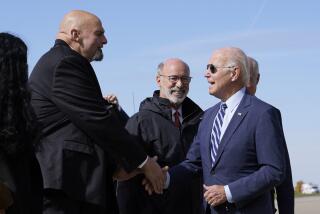Bush Receives Another Dose of Urban Woes : Inner city: White House adds a meeting with Pittsburgh community leaders to fund-raising trip. President seems uneasy during talk.
- Share via
PITTSBURGH, Pa. — Trying to show a more compassionate face, President Bush paid another visit to inner-city America here Friday in what has come to resemble a get-acquainted tour of the nation’s urban woes.
The visit to a poverty-stricken borough was the fifth in eight days for Bush, who until the Los Angeles riots had rarely ventured beyond hotel ballrooms and suburban venues.
Sitting in a folding chair in a linoleum-tiled auditorium, Bush once again heard advice from community leaders troubled by what they said is a shortage of federal assistance for social welfare programs.
Just as he had earlier in the week in Philadelphia, Bush added the event to a schedule that initially had called for him to appear only at a $1,000-a-plate fund-raising event for his reelection campaign.
Earlier in the day, perhaps concerned that his sudden flurry of attention to urban problems might alienate traditional supporters, Bush took pains to temper his words with proud testaments to law and order.
Appearing in Washington at a ceremony honoring law enforcement officers killed in the line of duty, he reiterated his support for “the thin blue line that separates good people from the worst instincts of our society.”
But as the President proceeded by limousine from a genteel luncheon that raised $300,000 to the angry din of Pittsburgh’s most blighted blocks, it was clear that the lesson the White House had learned from the riots was that Bush could no longer appear remote from citizens and their concerns.
In its efforts to draw attention to such shows of concern, the White House again choreographed a scene that would have been almost unimaginable a month ago. It invited dozens of reporters to observe and even broadcast live the 30-minute meeting in which residents expressed--in often blunt terms--their dissatisfaction with the help the Bush Administration has offered.
As scores of protesters demonstrated outside, members of the invited group told Bush they were troubled that an anti-crime, anti-poverty program the Administration had established in the city had devoted too little of its attention to the social side of that agenda.
Bush listened patiently as each of 13 community leaders outlined their concerns. He told the group later that the session on urban problems “does help a lot” and that “you get more sense of it” by sitting down with local residents.
But he seemed uneasy and distant throughout the session, and he quickly established a pattern of responding to concerns by reciting the urban programs his Administration has re-offered in the wake of the riots.
Bush also told the group that he knew unemployment in Pittsburgh’s Hill District was “pretty darn high.” But he was clearly taken aback when he was told by City Councilman Jake Milliones that the jobless rate there was near 45%.
As helicopters circled overhead, Bush arrived for the session by motorcade only minutes after attending the fund-raising luncheon at a local auditorium that city officials said was just a block from the most brazen drug trafficking center in the area. Among those waiting across the street to register their discontent was Wanda Williams, a young mother who carried a handwritten sign that asked: “What took Bush so long to get here?”
Just up the block, Dwight Owens, a 44-year-old painter, also expressed skepticism about the Bush visit. “I just wonder what he’s going to do?” Owens asked. “Is he just campaigning, or does he have something in mind. Is he going to give us jobs?”
Later Friday, he flew on to Houston, where he addressed a banquet at a charity golf tournament benefiting the United Negro College Fund.
Victoria Clarke, Bush’s campaign press secretary, acknowledged that the repeated visits to inner-city America represented a change of tack, but she said the President had devoted considerable attention to urban problems.
Asked why he had not traveled more often in the past to urban areas, she said: “They hadn’t had riots, I guess.”
More to Read
Get the L.A. Times Politics newsletter
Deeply reported insights into legislation, politics and policy from Sacramento, Washington and beyond. In your inbox twice per week.
You may occasionally receive promotional content from the Los Angeles Times.










